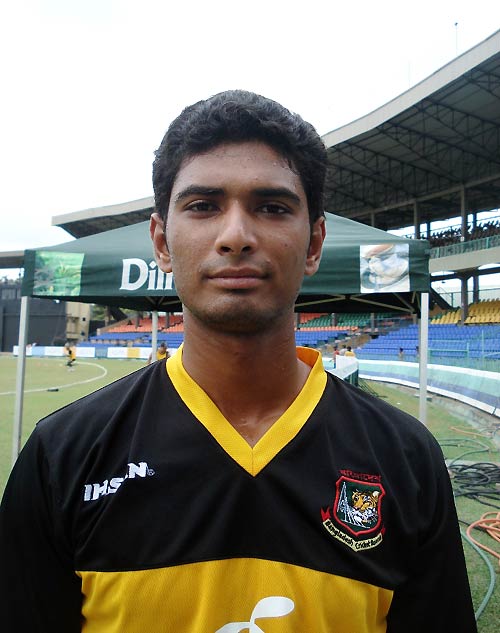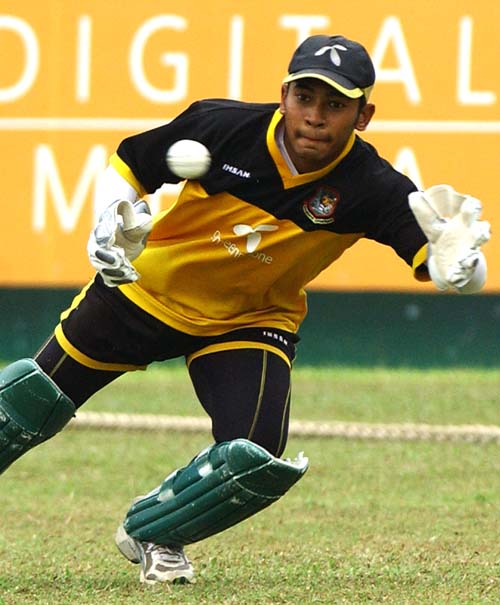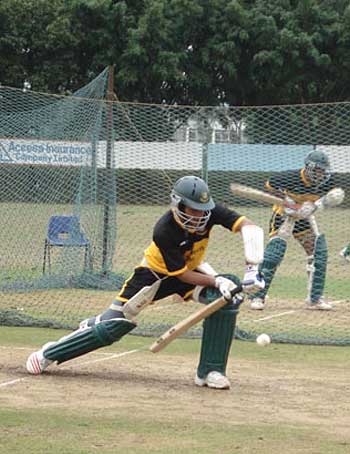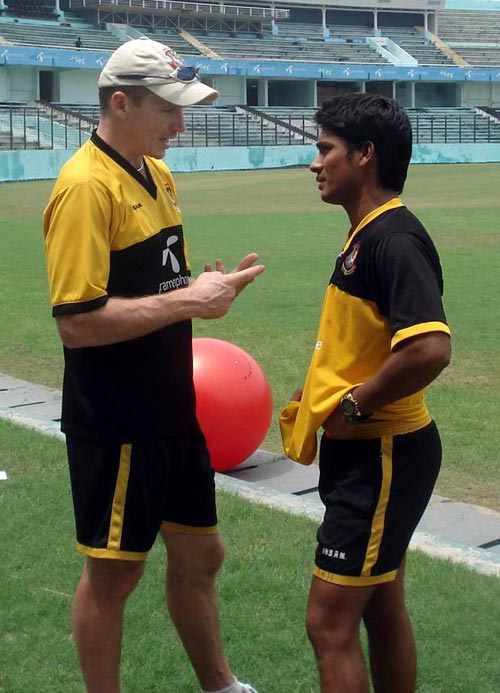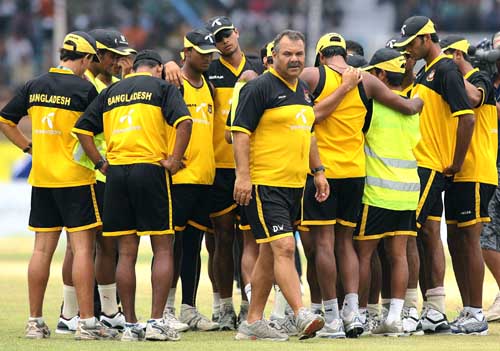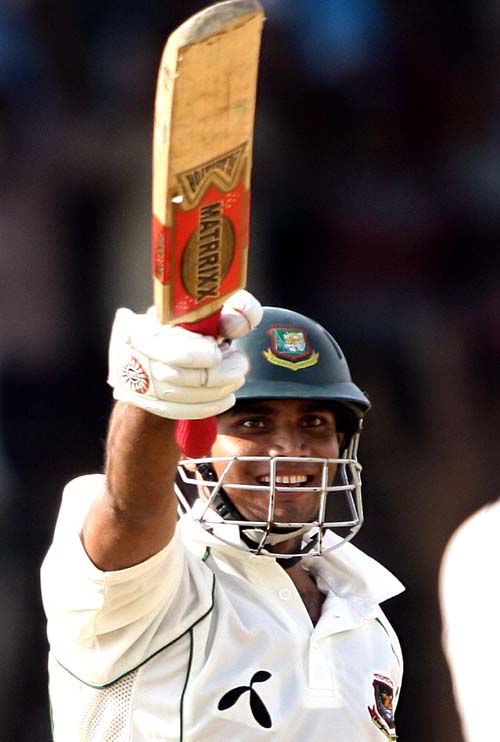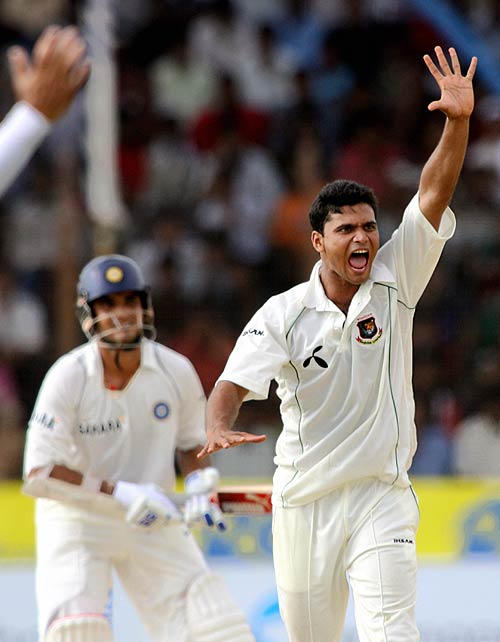BanglaCricket: You were the captain of Bangladesh in their debut Test in November 2000. Now seven years later, again in November 2007, you are part of the Test set up, this time picking the national squad as a selector. What made you interested in taking up this role?
Naimur Rahman: It was a great honor to lead the country in the debut Test; nothing is comparable to that feeling. When I started as a player we all dreamt about playing Test cricket one day. It (maiden Test) was a great occasion for Bangladesh cricket, the beginning of a new era and I was lucky that I was picked to lead the team. My Test career was rather short due to a number of reasons but I am happy to be back again as a selector. Cricket is my passion and the offer to associate myself with Bangladesh cricket was too good to turn down.
BanglaCricket: Do you think Bangladesh cricket has made satisfactory progress over the last 7 years?
|
BanglaCricket: Why we have failed to transform our success in One Day cricket to Test cricket? The same core group of players is playing both formats but on many occasions we seem incapable of even putting up a semblance of a fight.
Naimur Rahman: Our failure in Test cricket is unfortunate but not unexpected. Look at the foundation for our recent ODI successes. We have had a long culture of competitive one day cricket in Bangladesh. The Dhaka Premier League, which has been our leading, club-based, 50 over competition, has featured players like Wasim Akram, Neil Fairbrother and Arjuna Ranatunga. The atmosphere at the Premier League matches was always very competitive, the financial packages were satisfactory and all these factors helped players to develop the temperament for one day cricket.
Now if we look at the National Cricket League which is our only first class competition, you will find a completely different scenario. In the recent past players were reluctant in participating in the NCL due to poor facilities and the board had to force them by making it mandatory for national team hopefuls. Nevertheless, the poor wickets, afore-mentioned poor facilities, and poor financial package all resulted in rather poor cricket.
The gap between the standard of our domestic cricket and international cricket is still unacceptable and until recently the atmosphere of competitive cricket was completely absent from our first class structure. One cannot expect to develop the temperament of Test cricket without playing serious and competitive 1st class cricket!!
The good news is that some good steps were undertaken over the last 2 years and the current BCB has taken the initiative to make NCL more competitive, increasing the financial rewards for the players. The situation is still at developing stage, but I can assure you that we are heading towards right direction, and we will be able to reap the benefits of these steps within 2-3 years.
BanglaCricket: You have just alluded to the fact that the standard of our domestic cricket is not satisfactory and we have heard this often in the past. Every year we hear that "things will get better". Why it is taking so long to develop the standard?
|
BanglaCricket: You are taking on the responsibility of a selector after a successful stint by the Faruk Ahmed led national selection panel; one during which they have firmly established the role of "professional national selector" in Bangladesh cricket. Do you feel any extra pressure as one of their successor?
Naimur Rahman: The last panel did a pretty good job and we (the current panel) want to carry on from where they have left. Selection is a continuous process and we aim to do even better. I have a feeling that they (previous panel) may have had a tad too much experimentation in the national team, which in some cases has backfired. The current panel wants to learn from their mistakes and we want to form a more stable national team.
BanglaCricket: So ... are you planning for any major changes in selection policy?
Naimur Rahman: Not really. I don’t think there is scope for major changes in the selection policy. In some cases our previous selection committee tried to groom some players at the international level but some of them could not cope with the pressure and eventually we lost their service. I want to make the players ready for the national team before handing them the national cap. We want to get maximum output and longer service from national players and don’t want to expose young players (to the rigors of the top-flight level) too early. It takes time to make a player and losing them early is a huge loss for our cricket. Selection is not an individual decision, we have a panel of three and I am only a member there. I will try to espouse my personal vision as it fits in the framework for the greater interest of Bangladesh cricket.
BanglaCricket: Bangladesh is a very young team and the few regular senior players we have, the Habibul Bashars, Mohammad Rafiques or Khaled Masuds are all on the brink of retirement. Do you think we still need them for guiding the young players?
Naimur Rahman: We need a blend of experience and youth, especially in Test cricket. As long as the seniors are physically fit and performing, they will be always considered for selection. Players like Habibul Bashar and Khaled Masud are still required in the Bangladesh team; we should not forget their past contributions on account of their failures in one or two series. At the same time we have to groom their successors as no one can play for an indefinite period. We have good back-ups for Rafique in Enamul Junior and Md. Razzak, Mushfiqur Rahim is slow gaining experience to replace Khaled Masud.
In ODIs and T20 cricket we (the selection panel) have already identified a core group of younger players and we should stick to them for the next couple of years unless someone from outside that group demonstrates extraordinary performances.
BanglaCricket: Bangladesh’s next away series is with New Zealand, typically a very tough tour for sub-continent teams. What will be your vision in selecting the New Zealand bound squad?
Naimur Rahman: We don’t want to make too many changes in the current squad. There might be some changes which are required and we will only try to focus on those places. We want to rely on experienced and performing players for this difficult tour. There are some young players performing consistently in the domestic league, but we don’t to throw them into the big test in New Zealand conditions as this might dent their confidence. We have to understand there is a huge value to experience in Test cricket, especially in difficult conditions.
BanglaCricket: What do you expect from Bangladesh against the Black Caps?
Naimur Rahman: As I have said previously, it will be a tough tour for Bangladesh. We can only select the players; it is they who have to perform on the field to get a positive result. The seniors must take responsibility on a tour like this so that the young players can play their natural game and don’t feel too much pressure. It’s difficult to guess the outcome but I am staying positive.
BanglaCricket: As you mentioned young players, I wanted to know about your views on Imrul Kayes, Zunaed Siddique and Nazimuddin who are performing well in the NCL.
Naimur Rahman: We have a good number of young players who are performing well in the domestic cricket. Nazimuddin is one of the more technically sound players in the pipeline, but he is still young and learning. He has performed quite well with the A team in different conditions, but I want to give him some more time before considering him for Test cricket.
Zunaed and Imrul have just started playing cricket. They should go through the Academy and A team before getting the national cap for Tests and ODI. Zunaed is a good find for us in the Twenty20 cricket. Both will get their opportunities in due time.
BanglaCricket: Tushar Imran and Alok Kapali: both of them were successful A team players but failed to translate their success at international level despite countless opportunities. Any thoughts on them?
Naimur Rahman: Every player is different and does not enjoy the same level of success at different levels. Alok was given a good number of opportunities but Tushar was unlucky in many cases. They will remain in our minds as long as they are working hard and performing in the domestic cricket. Nobody is discarded permanently, there is always a chance to comeback. This applies not only for Tushar or Alok but also for all other players who were discarded at different times for different reasons.
BanglaCricket: We have seen in the past that some players like Al Shahriar, Ehsanul Haque were continuously ignored despite scoring heavily in the domestic league. Do you want to open the door even for them?
Naimur Rahman: Why not? If they can remain fit and perform consistently, they will always be in the frame of things.
BanglaCricket: In the past politics within the board has sometimes been blamed for some selection decisions. Do you think current selection committee can remain free from political influences?
Naimur Rahman: There is no place for politics in our cricket infrastructure or processes. What happened in the past should remain in the past. No one knows better than me about the ill effect of politics on a player’s career. I personally want to make selection process fair and free from any outside influences.
BanglaCricket: Do you think selectors’ role should not just be restricted to declaring squads? Should they also influence the selection of the playing XI?
Naimur Rahman: It depends on situation. We don’t want to influence the decisions of the team management in any tour, but in the home series we might give some input on the playing XI. I don’t think there is a universal policy on this.
BanglaCricket: Bangladesh bowling is often branded as one dimensional , after your departure from international scene we have not unearthed a single quality off-spinner or leg-spinner. Your thoughts on this issue?
Naimur Rahman: The success of Rafique as a bowler might be the reason behind the good number of SLA prospects the team enjoys. Having said that, we desperately need a good off or leg break bowler who can serve Bangladesh cricket for a long time; especially in Test cricket. Once we find someone, youngsters will be inspired with his success and will take off-spin or leg-spin more seriously. We are working on this issue but finding a quality spinner is a lengthy process, it will not happen overnight.
BanglaCricket: Recently Mohammad Ashraful was appointed as the Bangladesh captain. You have played with him. How do you rate him as a captain?
Naimur Rahman: Ashraful knows his cricket very well. He has just started as a Captain and is still learning the art of captaincy. I am hopeful about his future as Bangladesh captain and he is quite capable of leading his team from the front with exceptional performances.
BanglaCricket: Any comments on the 4 year tenure of Dav Whatmore?
Naimur Rahman: I am satisfied with the progress made in the ODI cricket under Dav Whatmore. He transformed a losing side into a winning outfit and instilled confidence, but I am not happy with our performance in the Test cricket. There was too much experimentation and thus too many changes in the squads. He doesn't seem to have worked with individual players in terms of establishing them in the longer version of the game. In my opinion more work should have been done in Test cricket for a sustainable development of Bangladesh cricket.
BanglaCricket: After a lengthy delay, BCB has finally appointed Jamie Siddons as Bangladesh coach. Can you give us your perspective?
Naimur Rahman: I think the BCB has made a very good choice here. He was a very good batsman and has an excellent coaching pedigree. I am looking forward to work with him.
BanglaCricket: Do you want to see Siddons and Ashraful within the selection committee as a member?
Naimur Rahman: It’s a policy decision and BCB should decide on it. I would definitely like to consult with them before selecting the squad.
BanglaCricket: One final question. Where do you want to see Bangladesh cricket at the end of your 3 years tenure as a selector?
Naimur Rahman: Do you mean in ranking? I don’t want to correlate development with ranking. Nowadays almost every team takes Bangladesh seriously in ODI matches. I want to see Bangladesh earning the same level of respect in Test matches. We also have a vision for 2011 World Cup Cricket in which we are a co-host. We want do better than our performance in the last world cup to make it a memorable event for Bangladesh. To achieve our target, we want to build a strong A team culture along with Academy and age group teams. There should be a smooth transition from age group teams, where we are performing quite well, to the national team so that a player becomes ready for international cricket.
BanglaCricket: Thank you very much for your valuable time and thoughts about Bangladesh cricket.
Naimur Rahman:Thank you for providing this forum to connect with our fans.



